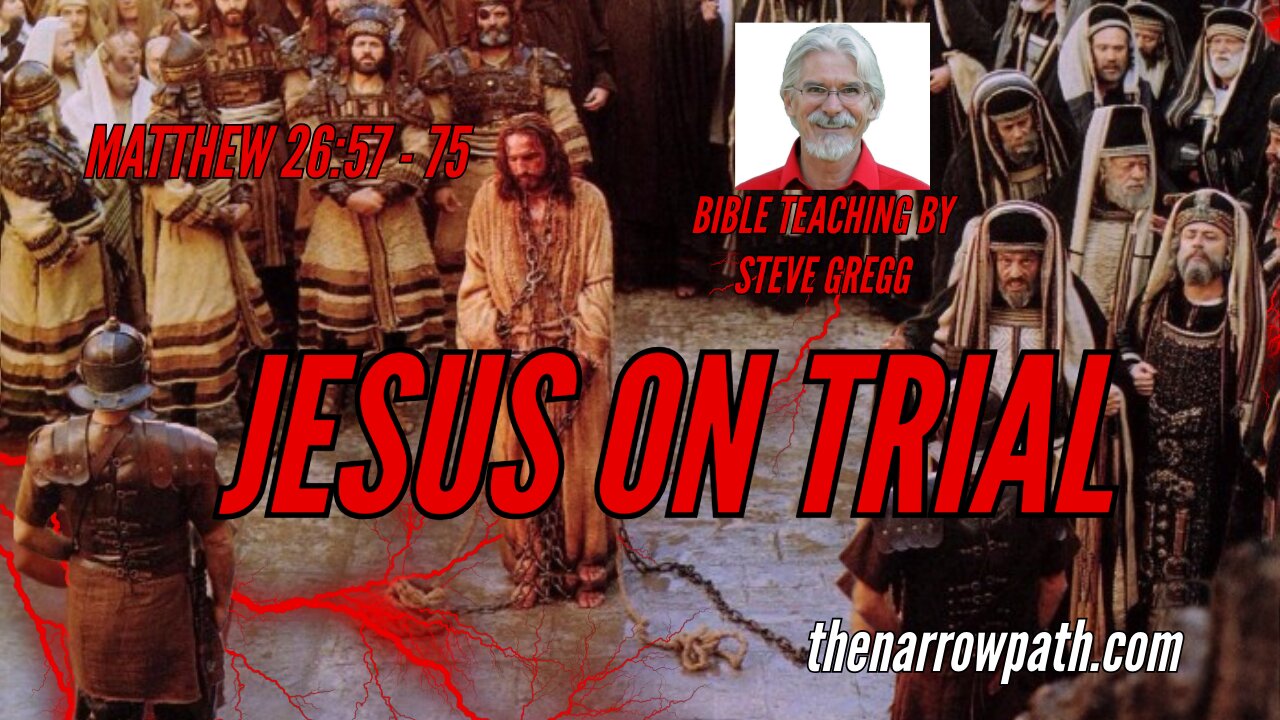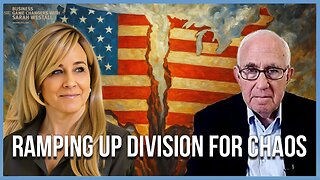Premium Only Content

Jesus on Trial (Matthew 26:57-75) - Steve Gregg
https://thenarrowpath.com | In Matthew 26:57-26:75, Steve Gregg discusses the trial of Jesus by the chief priests and false witnesses. He explains that the witnesses' claims were inconsistent and did not meet the Jewish law's regulations. Jesus was mocked and beaten by the high priest trial, and Peter denied Jesus three times. However, Jesus later restored Peter's salvation and position among the apostles. Steve Gregg emphasizes Jesus' prediction of his second coming and the importance of standing firm in faith during times of trial. Transcript: https://opentheo.org/i/765611936653040107/matthew-2657-2675
Outline of Steve Gregg’s Lecture on Matthew 26:57–75
Introduction
• Context: Jesus’ arrest in the Garden of Gethsemane, betrayed by Judas, with Peter attempting to defend Him by cutting off Malchus’ ear (Matthew 26:47–56).
• Jesus submits to arrest to fulfill Scripture, despite having the power to call twelve legions of angels.
• Disciples forsake Jesus and flee, though Peter and John follow at a distance, with Peter acting cowardly (Matthew 26:56).
Jesus’ Trial Before Caiaphas (Matthew 26:57–68)
• Jesus is led to Caiaphas, the high priest, where scribes and elders are assembled (Matthew 26:57).
• The Sanhedrin seeks false testimony to condemn Jesus to death but struggles to find consistent witnesses (Matthew 26:59–60).
• Jewish law requires at least two witnesses for a conviction; many false witnesses come forward, but their testimonies do not agree (Mark 14:56).
• Two witnesses eventually claim Jesus said, "I am able to destroy the temple of God and to build it in three days" (Matthew 26:61; cf. Mark 14:58).
• Misquotation of Jesus’ actual statement: "Destroy this temple, and in three days I will raise it up," referring to His body, not the physical temple (John 2:19).
• The charge is insufficient for a death penalty, as it is not inherently blasphemous or unlawful.
• Caiaphas, frustrated, breaks Jewish legal protocol by directly questioning Jesus, adjuring Him to declare if He is the Christ, the Son of God (Matthew 26:62–63).
• Jesus responds, affirming He is the Christ and Son of God, and predicts they will see the Son of Man "sitting at the right hand of the Power, and coming on the clouds of heaven" (Matthew 26:64).
• Interpretation of Jesus’ prediction:
– Likely refers to His coming in judgment in 70 AD, not the Second Coming, as Caiaphas and others would see it in their lifetime (cf. Matthew 16:28, 24:34).
– Old Testament imagery of God’s judgment (e.g., Roman destruction of Jerusalem) supports this view.
• Caiaphas tears his clothes, claiming blasphemy, though Jesus’ statements do not meet the legal definition of blasphemy (Matthew 26:65–66).
• The Sanhedrin declares Jesus deserving of death, a foregone conclusion, and He is mocked, spat upon, and beaten (Matthew 26:66–68).
Peter’s Denial (Matthew 26:69–75)
• Peter, following at a distance, sits in the courtyard and is recognized as a follower of Jesus (Matthew 26:69).
• Three denials:
– A servant girl identifies Peter as being with Jesus; he denies knowing Him
(Matthew 26:70).
– Another girl says Peter was with Jesus of Nazareth; he denies it with an oath (Matthew 26:71–72).
– Bystanders note Peter’s Galilean accent, indicating he is a disciple; he curses and swears, denying Jesus again (Matthew 26:73–74).
• After the third denial, a rooster crows, fulfilling Jesus’ prediction (Matthew 26:34);
Jesus looks at Peter, who remembers and weeps bitterly (Matthew 26:74–75; cf. Luke 22:61).
• Peter’s cowardice contrasts with Jesus’ warning: denying Him before men risks being denied before the Father (Matthew 10:33).
• Jesus later restores Peter’s salvation and position among the apostles after His resurrection (John 21).
Conclusion
• The trial reveals the injustice of the Sanhedrin, who sought to condemn Jesus despite lacking valid evidence, resorting to a questionable blasphemy charge.
• Peter’s denials highlight human weakness and cowardice, a warning against failing to stand for Christ under pressure.
• Jesus’ submission to His fate fulfills Scripture, and His prediction of coming in judgment underscores His divine authority.
• Encouragement to boldly proclaim Christ, learning from Peter’s mistake, even in the face of persecution.
#jesus #jesuschrist #trial #gospel #injustice #innocent #persecution #falseaccusations #gospelofmatthew #matthew26 #peter #faithless #sin #failure #repentance #israel
#bibleteaching #biblestudy #sacrifice #thenarrowpath #stevegregg #miracle
-
 54:05
54:05
The Narrow Path
2 months agoThe Sin of Worry - Steve Gregg 7.6.2025
741 -
 LIVE
LIVE
Lofi Girl
2 years agoSynthwave Radio 🌌 - beats to chill/game to
233 watching -
 33:02
33:02
DeVory Darkins
7 hours ago $34.24 earnedComey INDICTED by grand jury in shocking announcement by DOJ as Trump claims MAJOR VICTORY
38.4K94 -
 2:06:23
2:06:23
Inverted World Live
8 hours agoEpstein Worked for CIA According to OMG Reporting | Ep. 114
133K41 -
 3:14:39
3:14:39
TimcastIRL
9 hours agoTrump DOJ Indicts James Comey, The ARRESTS Have BEGUN | Timcast IRL
322K372 -
 7:54:14
7:54:14
SpartakusLIVE
10 hours ago#1 Hulking MASS squashes NOOBS for viewers’ DELIGHT
72.6K2 -
 1:32:21
1:32:21
The Charlie Kirk Show
8 hours agoTHOUGHTCRIME Ep. 98 — The Comey Indictment? Antifa Agenda? Charlie and the Cubs?
126K61 -
 1:04:56
1:04:56
Sarah Westall
9 hours agoPolitical Assassinations, Targeted Hit Lists - Manufactured Chaos w/ Harley Schlanger
79.1K13 -
 1:11:31
1:11:31
Flyover Conservatives
15 hours agoThe “J Walker” Secret: One Daily Habit That Shifts an Entire City - Tammy Hotsenpiller | FOC Show
68.8K6 -
 2:12:02
2:12:02
Mally_Mouse
11 hours ago🎮Throwback Thursday! Let's Play: Wii Sports Resort!
56K2